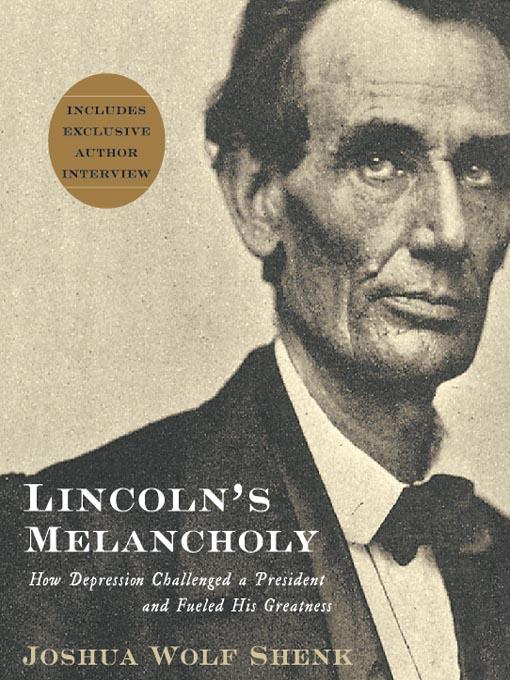
Lincoln's Melancholy
How Depression Challenged a President and Fueled His Greatness
- اطلاعات
- نقد و بررسی
- دیدگاه کاربران
نقد و بررسی

Lincoln suffered bouts of major depression in early adulthood and endured chronic depression the balance of his life. Author Shenk weaves careful evidence that the great president's persistence through the personal hardship of depression built the foundation for leadership during one of our nation's darkest periods. Richard M. Davidson's straightforward and even-toned voice lends credibility to Shenk's underlying theme: Lincoln felt that the most you can do in life is to make the best of its inevitable bad situations. Davidson's consistent tone is sometimes plodding but, fortunately, never melancholy as the book's title might suggest. He renders this work palatable to armchair Lincolnphiles without the benefit of formal training in history or psychology. N.M.C. (c) AudioFile 2006, Portland, Maine

July 11, 2005
Abe the Emancipator, argues Washington Monthly
contributor Shenk, struggled with persistent clinical depression. The first major bout came in his 20s, and the disease dogged him for the rest of his life. That Lincoln suffered from "melancholy" isn't new. Shenk's innovation is in saying, first, that this knowledge can be illuminated by today's understanding of depression and, second, that our understanding of depression can be illuminated by the knowledge that depression was actually a source of Lincoln's greatness. Lincoln's strategies for dealing with it are worth noting today: at least once, he took a popular pill known as the "blue mass"—essentially mercury—and also once purchased cocaine. Further, Lincoln's famed sense of humor, suggests Shenk, may have been compensatory, and he also took refuge in poetry. Unlike Americans today, Shenk notes, 19th-century voters and pundits were more forgiving of psychological and emotional complexity, and a certain prophetic pessimism, he notes, was appropriate to the era of the Civil War. Occasionally, Shenk chases down an odd rabbit trail—an opening meditation on whether Lincoln was gay, for example, is neither conclusive nor apposite. Still, this is sensitive history, with important implications for the present.

October 31, 2005
Davidson delivers a fine performance in this exploration of Abraham Lincoln's depressive nature and its influence on his political life. From boyhood through assassination to legacy, Shenk probes all chambers of the 16th president's troubled heart. Davidson's voice is perfectly complementary for such historical and intimate matter, offering up an inviting rocking-chair-by-the-fire feel. So fitting is his voice that it feels anachronistic when Shenk veers into the present, bringing Davidson's earthy, log-cabin tones along with it. But the narration is, for the most part, flawless (save for a few surprising mispronunciations). Davidson's engagement with the material never flags despite the sometimes abrupt time-hopping and dense side paths Shenk periodically travels. Davidson recites several poems beautifully and renders an excellent Irish brogue. Listeners may find the musical cues confusing, though. For example, moody piano lines occasionally close out sections in the middle or latter part of a disc, falsely prompting the finger toward the eject button. The production also features several extras including a somewhat superfluous NPR-style interview with Shenk plus an excerpt from an upcoming Benjamin Franklin biography. Overall, despite a few quirks, a full and worthy listen. (Reviews, July 11)

Starred review from July 1, 2006
In an 1876 eulogy, Frederick Douglass famously -and foolishly -asserted that -no man can say anything that is new of Abraham Lincoln. - Thirteen decades and hundreds of books later, that statement appears no closer to the truth than when Douglass uttered it. Although Lincoln may be the most studied figure in American history, there is no end to new interpretations of the man. Shenk -s and Goodwin -s engaging new books are impressive demonstrations of that truth. Looking closely at Lincoln -s entire life, essayist Shenk examines every scrap of evidence that Lincoln suffered from chronic depression so severe that he twice came close to suicide. He argues that Lincoln not only never conquered his depression but used it to channel his energy into his political work. Shenk -s thesis may not convince everyone -including Goodwin, who takes a different view -but both arguments and his evidence are compelling. His is a fascinating story and one enhanced by Richard M. Davidson -s forceful reading. Highly recommended.
Nearly three times longer than Shenk -s book, Goodwin -s study covers much of the same ground but concentrates more on Lincoln -s presidency. She argues that Lincoln -s success in winning the election and in building an exceptionally effective administration lay in his extraordinary ability to empathize with his rivals. Much more than a biography of Lincoln, historian Goodwin -s book also closely examines the lives of Lincoln -s chief opponents for the Republican nomination -Edward Bates, Salmon P. Chase, and William H. Seward -all of whom appeared better qualified to be President than he. After Lincoln persuaded the three men -as well as other strong figures -to join his cabinet, it was expected that his former rivals would dominate him. Instead, the exact opposite occurred. Suzanne Toren -s narration of the unabridged version is fine, but the book -s sheer length may demand a greater commitment than many listeners are willing to make. As such, the abridged edition, read by Richard Thomas, may be a better choice for most libraries." -R. Kent Rasmussen, Thousand Oaks, CA"
Copyright 2006 Library Journal, LLC Used with permission.




دیدگاه کاربران